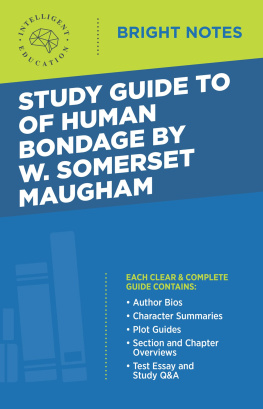

BRIGHT NOTES: Demian
www.BrightNotes.com
No part of this publication may be used or reproduced in any manner whatsoever without written permission, except in the case of brief quotations in critical articles and reviews. For permissions, contact Influence Publishers http://www.influencepublishers.com.
ISBN: 978-1-645422-10-5 (Paperback)
ISBN: 978-1-645422-11-2 (eBook)
Published in accordance with the U.S. Copyright Office Orphan Works and Mass Digitization report of the register of copyrights, June 2015.
Originally published by Monarch Press.
John Whiton, 1973
2020 Edition published by Influence Publishers.
Interior design by Lapiz Digital Services. Cover Design by Thinkpen Designs.
Printed in the United States of America.
Library of Congress Cataloging-in-Publication Data forthcoming.
Names: Intelligent Education
Title: BRIGHT NOTES: Demian
Subject: STU004000 STUDY AIDS / Book Notes
CONTENTS

INTRODUCTION
FAMILY BACKGROUND
Like many German writers, Hermann Hesse came from a family which had for many generations been associated with the Protestant clergy. The father, Johannes Hesse, was a protestant clergyman who belonged to the pietistic tradition, a liberal branch of German Protestantism which stressed a concern for the individuals relationship to God above strict formal dogma. Hermann was later to acknowledge the importance of the religious atmosphere of his childhood, as, for example, in a letter dated 1950 in which he spoke of Christianity as it was lived, rather than preached, in his home. Johannes Hesse spent the years 1869 to 1873 as a missionary in India. There he acquired an interest in Oriental philosophy and theology which he was to retain for the rest of his life. Forced to return to Europe on account of poor health, he settled in Calw, a town in Southwestern Germany, where he was active as an author of works on religious subjects. Hermanns mother, Marie, came from a similar background; she had been in India as the wife of a missionary. She was living in Calw after the death of her first husband when she met Johannes Hesse.
Hermann, the second of six children, was born in Calw on July 2nd 1877. Four years later the family moved to Basel, Switzerland, and acquired Swiss citizenship. The father continued his religious work in Basel where he became the editor of a missionary magazine. In 1886 the family returned to Calw where Hesse was to remain until leaving home to attend a boarding school in 1890. Hermanns early childhood years were for the most part pleasant and they were certainly intellectually stimulating. Literature, philosophy, and the arts were discussed and respected in his home. Guests, many of whom came from foreign lands, were often entertained there. Hermann felt an especial affinity to his mother whose loving care provided him with a feeling of security and well-being. His father, on the other hand, in spite of his tolerance in regard to many theological matters, believed in strict discipline and followed rigid theories of education which allowed no room for freedom of expression on his sons part. Many of the difficulties of these early years are reflected in Hesses works, as, for example, in A Childs Heart. As a boy, Hermann was not an outstanding pupil and did not enjoy school; he once remarked that he had had only one teacher whom he admired.
SEARCH FOR A CAREER
As was common in Germany at that time, Hermann was sent to a boarding school to prepare for the difficult examination which all students had to pass in order to be admitted to advanced schools and the university. He entered the school in Gppingen in 1890 to undertake this preparation. At this school, for the only time in his life, he was an exceptionally good student. After successfully passing the examination, he followed the wishes of his father and enrolled in the famous school at Maulbronn with the intention of becoming a Protestant minister. The atmosphere of the school soon proved too oppressive and Hermann ran away. He returned, but once more was unable to adjust and soon left the school permanently. The months which followed were exceedingly traumatic for the disturbed youth. Help was sought from various persons and institutions, but Hermanns emotional problems could not be alleviated. Once he even went so far as to attempt suicide. His final exposure to formal education was at a preparatory school in Bad Cannstatt in 1893 and 1894. Hesse was not at all happy there and his experiences formed the basis for the descriptions of some of Sinclairs unhappy school experiences in Demian.
While doing mechanical work in a Calw clock factory in 1894 and 1895, the young Hesse decided that he wanted to become a writer. He soon found employment in a bookstore in Tbingen and began to see meaning, or at least potential meaning, in life. In 1899 he published his first books, a collection of poetry and one of short prose pieces. In that same year he moved to Basel where he continued to work in the book trade and to expand his horizons, by reading books of many different kinds, and by traveling in Switzerland and Italy. Two years later he wrote a book which attracted the attention of some important German critics and which accordingly established Hesses reputation as an author: The Posthumous Papers and Poems of Hermann Lauscher.
IMPORTANT EARLY WRITINGS
Other books followed, including, in 1904, the novel Peter Camenzind. This book was immediately successful and the royalties from it and from other writings gave Hesse a degree of financial independence. He was accordingly able to leave the book trade and devote himself entirely to his writing. The novel is about a poor but talented Swiss boy who grows up in harmony with nature, but decides to go out into the world where he eventually attains a measure of material success in society. He ultimately comes to realize that he has not found self-fulfillment in love, intellectual pursuits, art, music, or material goods. Following the death of his close friend Boppi, a cripple, he finally retires to lead an isolated life free of the demands of society. Already in the first of Hesses novels we see very clearly the theme that will pervade all of the later ones: the difficult search on the part of an individual for identity and fulfillment.
Hesse soon became a respected member of the German literary elite and contributed stories, poems, reviews, and essays to many of the leading periodicals of that time. He also continued to write novels and the next one, Beneath the Wheel (1906), was to a great extent autobiographical. It relates the unsuccessful attempt of the hero, Hans Giebenrath, to cope with the stifling atmosphere of the educational system. The two sides of Hesses own nature are shown in Hans and in Hermann Heilner, who rebelled against the system and ran away. Hans, like Hesse, experienced many disappointments and eventually found himself unable to cope with the demands of his father and of the school. In two very important respects, however, the novel does not follow Hesses biography; Hans mother dies when he is very young, depriving him of a source of warmth and love, and Hans himself, in a state of depression, drowns while still a young man. One of many German literary works of the early twentieth century which attacked the educational system,
Next page












